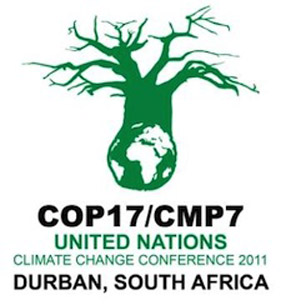COP17 will produce 15 000 tons of CO2

When 25 000 visitors flood in to Durban for COP17 carbon offsets have been avoided
eThekwini Environmental Planning and Climate Protection deputy head, Debra Roberts, said the initial assessment had factored in accommodation; conference venues; transportation; and waste removal logistics.
She said the national government would be focusing on the other aspects of the carbon footprint, such as international air travel, but the city was more concerned with the impact on energy and water resources.
“We are looking at prioritising adaptation to counter the effects of the carbon footprint.”
Adaptation would be “Africanised”, or tailored to suit the needs of those living in African cities.
“We have decided to launch a community ecosystem-based adaptation programme (Ceba) that will absorb 16 000 tons of carbon dioxide,” she said.
Communities would be involved in the collection of waste; removing alien plants and monitoring their re-growth; growing and replacing trees and recycling in the Umbilo River catchment area and around the Pinetown/Kloof areas.
These areas were chosen to give the disadvantaged communities of Chesterville and Cato Manor a chance to participate.
She said funding would come from a corporate sponsor and would make use of the expertise of the Wildlands Conservation Trust.
Roberts said the municipality had taken the ecosystem approach, as opposed to the carbon-offset approach, because they wanted to make their efforts beneficial to the community in the long term.
Valere Tjolle
Valere is editor of the Sustainable Tourism Report Suite 2011 Get your copy at a special offer price: HERE
 United Kingdom
United Kingdom United States
United States Asia Pacific
Asia Pacific












































Dozens fall ill in P&O Cruises ship outbreak
Turkish Airlines flight in emergency landing after pilot dies
Boy falls to death on cruise ship
Unexpected wave rocks cruise ship
Woman dies after going overboard in English Channel